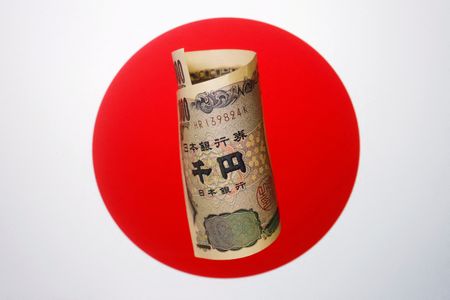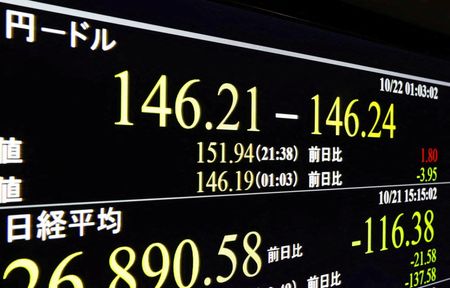By Tetsushi Kajimoto
TOKYO (Reuters) -Japanese authorities on Friday warned of intervention in the currency market after sharp swings in the yen overnight, which was triggered by softer-than-expected U.S. inflation data and a broad dollar sell-off.
Finance Minister Shunichi Suzuki told reporters authorities were closely watching market moves with a “high sense of urgency” and that they were ready to take action, if needed, echoing earlier remarks by top financial diplomat Masato Kanda.
The comments came after weaker-than-expected U.S. consumer price data lowered market expectations for aggressive Federal Reserve interest rate hikes, sending the dollar tumbling by 4 yen overnight versus the Japanese currency.
While the gains for the yen should comfort policymakers given its sharp 20% decline against the dollar this year, Tokyo has consistently warned against excessive one-sided currency moves.
Suzuki declined to comment when asked whether Japan intervened to stem sharp yen gains overnight.
Japanese authorities stepped into the market in September to prop up the yen for the first time since 1998, and intervened again last month when the dollar strengthened to 32-year high close to 152 yen.
“The government will closely watch currency market moves with a high sense of urgency and respond appropriately if necessary,” Suzuki told reporters.
The dollar’s slide overnight was broad, losing significant ground against many of its rivals. The Japanese yen at one point climbed by its biggest single-day rise since 2008, hitting 140.9350 to the dollar.
On Friday morning in Tokyo, the dollar was fetching around 141.57 yen.
In the past, Japan’s interventions were conducted mostly to weaken the yen and support the export sector.
The U.S. Treasury Department on Thursday said no major trading partner manipulated its exchange rates to gain unfair competitive advantage through June 2022. The bulk of interventions seen were aimed at strengthening currencies, not weakening them, Treasury said in a semi-annual report.
Japan was on the Treasury’s monitoring list, but Suzuki said that it “doesn’t mean that it raises question about Japan’s currency policy.”
“We’ll appropriately coordinate with currency authorities from other countries including the United States,” he said.
(Reporting by Tetsushi Kajimoto Editing by Chang-Ran Kim, Sam Holmes & Shri Navaratnam)


